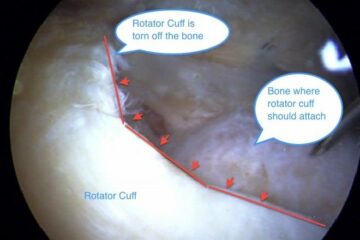
Shoulder pain is very common. Should we obtain an MRI on everyone with shoulder pain?
The quick and obvious answer is no … but let’s explore why.
- The rotator cuff is the most common source of pain in patients over the age of 30.
- Rotator cuff tears are very common in people over 40.
- The majority of rotator cuff issues are due to degeneration or attrition of the rotator cuff.
- Many degenerative or attritional rotator cuff tears do not need surgery and your pain will improve with physical therapy.
In my everyday life I see two types of people, those with shoulder pain and those who will have have shoulder pain. For most of you, your shoulder pain will subside spontaneously. Many of you will need to see a doctor because your shoulder pain will keep you up at night or make it difficult for you to continue with your daily activities.
What should your doctor do?
Should We MRI All Shoulder Pain?
Today we continue with our Expert Series where 4 Orthopedic Surgery experts in the area of shoulder surgery will continue answering a number of questions about the rotator cuff.
Jeffery Berg, MD: Website, Twitter
As with most diagnosis in medicine, for shoulder problems the patient’s “story” is usually the most important factor in determining the diagnosis. For me, the exam is then next most important. After that the response or failure to treatments (if appropriate for nonoperative care) and finally, imaging studies, including MRIs. In most shoulder problems, MRIs are typically only confirmations of the suspected diagnosis. In younger patients, MRIs are only fair in their ability to accurately identify the common shoulder problems this age group suffers. In older patients, because of the common and often asymptomatic “wear and tear” that is common in these patients, MRI’s often overemphasize the importance of common asymptomatic issues, such as degenerative rotator cuff tears. These are incidentally identified and often do not require any treatment.
As a result, in most cases I try to develop a diagnosis from the history and exam. I use MRIs with shoulder problems in the following situations: 1) Concern for time sensitive or limb or life threatening diagnosis that is unclear from the history and physical exam, 2) Failure to respond to nonoperative treatment and the diagnosis still remains unclear, 3) Need to better define, classify or further assess a known diagnosis, and 3) Preoperative surgical planning (for both me and my patients).
Scott Slattery, MD: Website, Twitter
MRI is currently the best way to image the rotator cuff tendons. Not every shoulder pain patient needs an MRI. A good history and physical exam will usually lead to a reasonable diagnosis without advanced imaging. Deciding to obtain a MRI depends on many factors including the time course and severity of the problem, patient age and activity level, and patient desires. Many painful conditions of the shoulder will respond well to non-surgical treatment. If there is no suspicion that there is a serious underlying problem and/or the problem has been present for a short time, a MRI is usually not necessary. If it seems like there is a serious problem that may require surgery or longstanding pain is continuing and increasing despite good care, a MRI may be appropriate.
Marty Leland, MD: Website, Twitter, Facebook
When I first see a patient over 40 with shoulder pain, my first treatment is anti-inflammatories, physical therapy, and frequently a subacromial steroid injection. I will then see the patients back 6-8 weeks later. If they are much better, there is no need for any further treatment. If they aren’t much better, I get an MRI to evaluate their rotator cuff. I usually do not order an MRI the first time I see them because, even if they do have a small rotator cuff tear, I would like to see if non-operative treatment would help them. If it does, GREAT! They may have avoided a surgery. I only order MRIs if they aren’t getting better. However, if I have a patient with a long history of shoulder pain and weakness and they are very weak on examination, I sometimes do order an MRI after the first office visit.
Derek Ochiai, MD: Website, Twitter
Because a good history and physical examination are very good at picking up shoulder rotator cuff issues, I typically do not initially get an MRI of a shoulder I’m trying to treat non-operatively. I use MRI’s when the diagnosis is in doubt or for pre-surgical planning. If the patient had a violent trauma with a lot of shoulder dysfunction, I might get an MRI in that setting, as acute rotator cuff repair for a complete tear would be reasonable. Likewise, if the patient is an overhead athlete with months of shoulder pain before I see them, I might get an MRI or even an MRI arthrogram (where dye is injected into the joint), to look for a SLAP tear (tear of the labral cartilage), which can occur with internal impingement.
Everyone who presents to an Orthopedist’s office with shoulder pain will not require an MRI. As our experts discussed, we may choose to MRI your shoulder if :
- Your diagnosis is in doubt
- You have not responded to physical therapy and we want to assess the quality of your rotator cuff
- You have suffered a severe injury and present with weakness
Next time you visit an Orthopedist for shoulder pain do not be upset if they do not order an MRI. They are rarely necessary to successfully treat the majority of people with shoulder pain.













I just had my 3rd MRI/MRA on my left shoulder. Each has shown a torn rotator cuff in the same area. First also showed SLAP tear. I have had surgery on it twice in the last year. Is it possible the tendon is just can’t heal? I am in my early 40s and very active.
Yes… not all cuff tears heal. Some repairs fail due to biology, some fail due to early strengthening, some fail due to early return to full activities, some likely fail due to poor repair technique. As you can see there are many reasons why rotator cuff repairs fail to heal. Figuring out why is important. The results of revision rotator cuff surgery is much worse than the results of the first or the primary repair.
I’ve had shoulder pain for about 7-8 months now. Last trip to my VA dr I got a cortisone shot. Count tell any difference. The pain is when I raise my arm and starts just under 90 degrees all the way up to 180. The pain is also present below 90 degrees but only while reaching back. I have a follow up appointment in about a week. NSAIDs have also been inneffective. Does this sound more like a tear or an impingement?
Most shoulder surgeons have gotten away from the term impingement. We call this degenerative rotator cuff disease or rotator cuff tendinosis. As such the rotator cuff and surrounding bursa are usually the source of pain… but not because they are being impinged by a bone spur.
A good exam and perhaps an US or MRI can help in determining the status of your rotator cuff. You can talk with your doc to see if they feel that physical therapy would be beneficial.
Good Luck
About 20 years ago I was blindsided while refereeing a hockey game and hit the ice full force with my arms straight out in front of me. I finished the game but was hardly able to remove my clothing afterwards due to the pain in both shoulders. Long story short – I saw a doctor, completed a number of weeks of PT with no improvement, had an arthrogram, and saw an orthopedic surgeon who confirmed rotator cuff damage. He said he could only offer 50/50 chance of improvement through surgery since he couldn’t determine from the arthrogram whether the damage was repairable. Since he indicated no long term ill effects from not repairing it – as long as I continued to use the shoulders within my pain tolerance – I elected not to go ahead with surgery due to extensive travel required by my job which would limit PT in recovery.
I’ve lived with various amounts of pain for 20+ years and limited my participation in sports. Two years ago I aggravated the shoulders (hedge trimming, raking leaves) and the pain has now increased to the point where it’s constant, acute and affects my ability to sleep, not to mention doing anything physical.
My question is – given the length of time since the injury and my age (66) would surgery offer me a good chance to at least alleviate the pain if not restore some strength also ?
Thank you.
An old injury doesn’t always mean that it will not respond to treatment now.
For rotator cuff damage that is old you may want to read this post too.
why would a doctor order laserscopic surgery on a shoulder of a 16yr old instead of a MRI? she is a softball player and has been having issues with her shoulder for a while . she went through rehab and that did not fix anything. now the doctor says that they need to go in and see what is wrong because they don’t know. why not just do a MRI first?
Yours sounds like a reasonable plan … It’s often important to know why you are operating on a joint before you start the operation.